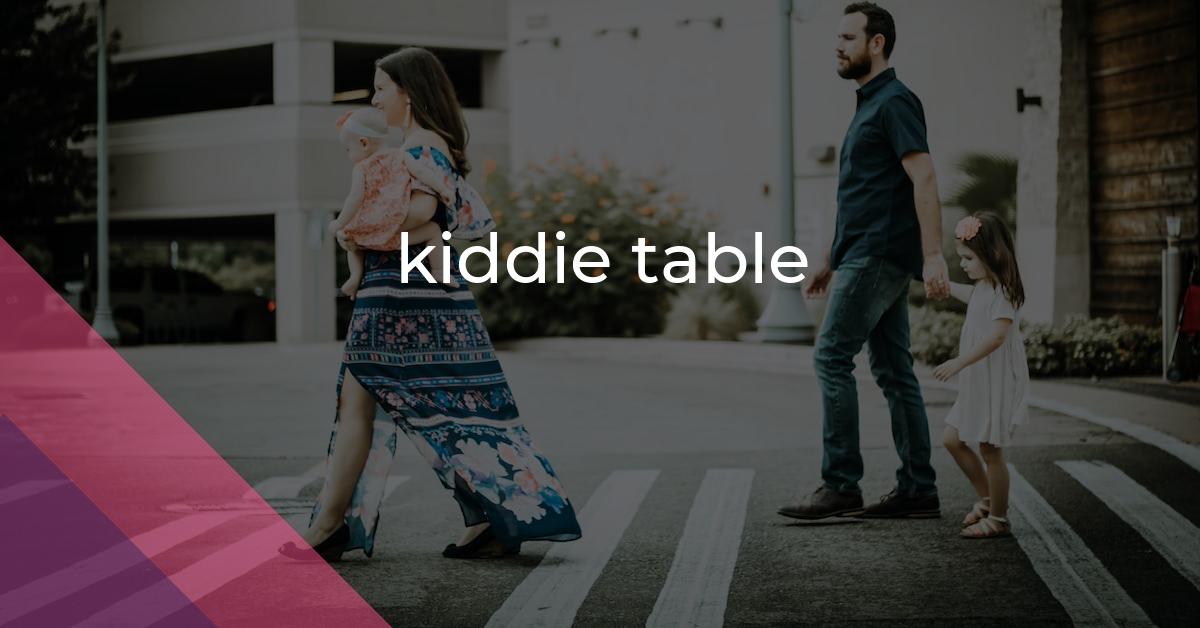kiddie table: Idiom Meaning and Origin
What does ‘kiddie table’ mean?
The idiom "kiddie table" refers to a separate, usually less prestigious, area or group designated for children, typically during a formal meal or event. It signifies a lower level of importance or inclusion, implying that the individuals in this group are not considered to be on the same level as the adults or main group.

Idiom Explorer
The idiom "table talk" refers to casual conversation that happens during a meal, often discussing lighthearted or non-serious topics. It can also imply gossip or discussions about controversial subjects.
The idiom "kidding aside" means to stop joking or fooling around and to start being serious or sincere.
*kid around*
(idiomatic) To engage in playful or lighthearted joking or teasing; to not be serious.
The idiom "inner circle" refers to a small, exclusive group of people who are closely connected and influential within a larger organization or social circle.
The idiom "have a seat" means to take a chair or place to sit down, often used as an invitation or suggestion to someone.
The idiom "handle with kid gloves" means to treat someone or something delicately or carefully, usually because they are sensitive or fragile. It implies the need for caution and gentleness in one's actions or words towards the person or object being handled.
The idiom "get together" means to meet or gather with someone or a group of people, typically for socializing or discussing something.
The idiom "drop out" means to leave a group or quit a situation, often referring to withdrawing from school or abandoning a course of action.
Hidden Social Hierarchy
The idiom "kiddie table" is a metaphorical expression that refers to a separate table or seating area for children at gatherings or events where adults are present. This idiom is primarily used in informal settings and is often associated with holiday meals such as Thanksgiving. The term "kiddie table" implies a division between children and adults, with the former being relegated to a less significant or important position.
This idiom draws upon the literal practice of assigning a separate table for children to sit and eat at social gatherings. Typically, the kiddie table is smaller in size and located away from the main dining area where the adults are seated. The purpose behind having a kiddie table is often to ensure that children have their own space and can interact with others their age, while allowing the adults to engage in more mature conversations without disruptions.
Metaphorically, the concept of the kiddie table symbolizes the perceived division between adults and children. When someone refers to being "at the kiddie table," they are expressing a sense of being excluded, overlooked, or not taken seriously. This idiom can be used to describe situations in which individuals, particularly adults, feel marginalized or treated as if their opinions or contributions are of lesser importance.
Furthermore, the metaphorical meaning of the kiddie table highlights the hierarchical nature of social gatherings. It underscores the distinction between those deemed to hold more authority or influence (the adults) and those considered subordinate or less significant (the children). This idiom can therefore be used to criticize or point out power imbalances and inequalities in various contexts, such as politics, business, or social interactions.
The idiom "kiddie table" is related to the idiom "table talk." "Table talk" refers to the conversations and discussions that take place during a meal, particularly when people are seated at a table. It can be casual or formal and may cover a wide range of topics. When someone is "at the kiddie table," they may feel excluded from the more important or serious "table talk" happening among the adults. This idiom further reinforces the notion of being sidelined or not being part of significant conversations or decision-making processes.
Additionally, the idiom "kiddie table" is connected to the idiom "kid around." When children are seated at the kiddie table, they often have the freedom to "kid around" or engage in playful behavior without the scrutiny or expectations that may be present at the adult table. "Kid around" means to engage in lighthearted or mischievous behavior, often in a joking or playful manner. The idiom "kiddie table" embodies the idea that children have their own space to "kid around" and have fun, separate from the more serious or formal interactions happening among adults.
Overall, the idiom "kiddie table" captures and conveys the notion of being excluded or relegated to a less significant position. It serves as a metaphorical reminder of the divide between children and adults, as well as the power dynamics that can exist within social settings. While the metaphorical implications of the term are clear, the idiom also raises questions about inclusivity, representation, and the role of individuals who may not have a seat at the proverbial adult table. The concept of the kiddie table invites exploration of broader societal issues, urging us to question and challenge established hierarchies.
Example usage
Examples of how the idiom "kiddie table" can be used in a sentence:
- I was always stuck at the kiddie table during family gatherings.
- She felt embarrassed to be put at the kiddie table with the younger kids.
- Even though he was well into his teens, his aunt still insisted he sit at the kiddie table.
More "Family" idioms



